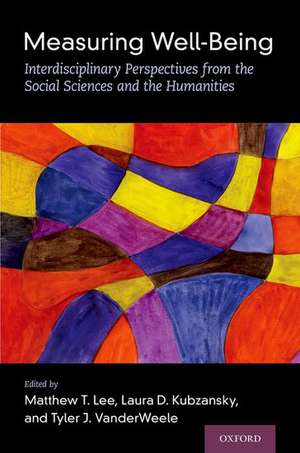Measuring Well-Being: Interdisciplinary Perspectives from the Social Sciences and the Humanities
Editat de Matthew T. Lee, Laura D. Kubzansky, Tyler J. VanderWeeleen Limba Engleză Hardback – 5 oct 2021
Preț: 341.92 lei
Nou
Puncte Express: 513
Preț estimativ în valută:
65.43€ • 71.36$ • 55.17£
65.43€ • 71.36$ • 55.17£
Carte disponibilă
Livrare economică 03-17 aprilie
Preluare comenzi: 021 569.72.76
Specificații
ISBN-13: 9780197512531
ISBN-10: 0197512534
Pagini: 622
Dimensiuni: 150 x 236 x 43 mm
Greutate: 1 kg
Editura: Oxford University Press
Colecția OUP USA
Locul publicării:New York, United States
ISBN-10: 0197512534
Pagini: 622
Dimensiuni: 150 x 236 x 43 mm
Greutate: 1 kg
Editura: Oxford University Press
Colecția OUP USA
Locul publicării:New York, United States
Recenzii
Measuring Well-Being represents a tremendous advance in discussions of wellbeing. Bringing together diverse disciplines and perspectives into dialog, this book provides critical historical and conceptual background for understanding the complexities and challenges in measuring well-being. Importantly, this book also provides practical guidance for selecting tools and implementing assessment across a range of contexts.
This interesting volume has something for everyone. It brings together the down-to-earth empiricism of the World Happiness Report with a wide range of philosophical and theological perspectives. And miraculously they produce agreed recommendations. A very thought-provoking read.
Measuring Well-Being: Interdisciplinary Perspectives from the Social Sciences and the Humanities, edited by Matthew Lee, Laura Kubzansky, and Tyler VanderWeele, is easily one of the most creative syntheses of past, present, and future research on well-being that exists. It is not often that a panel of such original and cooperative scholars—from disciplines such as psychology, psychiatry, philosophy, theology, economics, public health, political science, and policy—can be assembled. If you have an inquisitive mind and a creative motivation, this is a great read.
This interesting volume has something for everyone. It brings together the down-to-earth empiricism of the World Happiness Report with a wide range of philosophical and theological perspectives. And miraculously they produce agreed recommendations. A very thought-provoking read.
Measuring Well-Being: Interdisciplinary Perspectives from the Social Sciences and the Humanities, edited by Matthew Lee, Laura Kubzansky, and Tyler VanderWeele, is easily one of the most creative syntheses of past, present, and future research on well-being that exists. It is not often that a panel of such original and cooperative scholars—from disciplines such as psychology, psychiatry, philosophy, theology, economics, public health, political science, and policy—can be assembled. If you have an inquisitive mind and a creative motivation, this is a great read.
Notă biografică
Matthew T. Lee is Director of Empirical Research at the Human Flourishing Program in the Institute for Quantitative Social Science at Harvard University and coauthor of The Heart of Religion (Oxford University Press). His research explores pathways to human flourishing, benevolent service to others, and the integration of social science and the humanities.Laura D. Kubzansky is Lee Kum Kee Professor of Social and Behavioral Sciences and co-Director of the Lee Kum Sheung Center for Health and Happiness at the Harvard T.H. Chan School of Public Health. She has published extensively on the role of psychological and social factors in health. She has served on the leadership team for multiple training programs for junior scholars and is PI or co-investigator on numerous grants.Tyler J. VanderWeele is the John L. Loeb and Frances Lehman Loeb Professor of Epidemiology in the Departments of Epidemiology and Biostatistics at the Harvard T. H. Chan School of Public Health, Director of the Human Flourishing Program, and Co-Director of the Initiative on Health, Religion, and Spirituality at Harvard University. His research concerns methodology for distinguishing between association and causation in observational studies, and his empirical research spans psychiatric, perinatal, and social epidemiology; the science of happiness and flourishing; and the study of religion and health.
